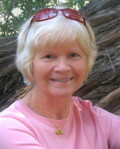CHAPTER ONE
Mack Barlow swore under his breath as he glanced at the clock on the dash. A quarter to eight and the sun just now rising. Days were short and would get shorter yet as the planet inched toward the winter solstice. Short, dark days did not sit well with him. They forecast dry spells for anyone in the construction trade. And when you threw a bum economy into the mix . . . Well, empty days eliminated excuses for taking care of family business.
The windswept land along I-40 flew past as he pushed his Bronco to the speed limit. He frowned, wondering if the sun had reached the ground in the short-leaf pine country where he was headed. There, forests and thickets so dense you needed a brush hog to clear them robbed the days of even more sunlight, which made for even shorter, darker days.
For years now, he’d made a practice of avoiding densely wooded country. He’d chosen to live in the Texas Panhandle for a reason. Spanish explorers had called the place Llano Estacado, Translated, Llano Estacado meant the staked plains. The land was flat and empty of vegetation for the most part with few landmarks. So large and barren was the expanse that early travelers drove stakes in the ground to find their way across and back again. But the empty country fit him to a T. There was nothing to interfere with a man’s vision there. It was safe ground.
He turned off the radio as it morphed to static, content with arrow-straight roads and his stoic road companions: pumpjacks sucking oil from the ground like giant metal grasshoppers and scrawny cows sucking water from stock tanks. Oil and water, he thought, liquid gold and liquid grace. Pumped from deep below ground made both commodities hard to get, and scarcity made them priceless.
An hour or so later, the land began to slope downward. Here, the North Fork of the Red River and Sweetwater Creek carved the earth deep, bringing forth enough moisture for scrub brush and cottonwoods to take hold. He slowed a bit, taking in the fall colors and the way the leaves danced in the breeze. But as he passed through a thick stand of juniper bush shadowing the road, the skin behind his ears began to crawl. Quickly, he looked into the rearview mirror, feeling an urgent need to check his six for snipers in the bush. As long-buried memories flooded back, he felt anger fill his chest, flush his face.
Why the hell was he making this trip, he thought, berating himself. His mother always did blow things out of proportion. But she’d been hounding him for a month or better, telling him, “You got to come home, it’s your grandfather. There’s a matter needs to be handled right away.”
“Is he about to kick the bucket?” he’d asked.
“No—yes . . . Well, he’s not dying at this exact minute, but that’s what’s causing the problem.”
“What problem?”
She had paused. “I’d rather explain in person.”
He’d pushed. “What? He got one of the nurses there at the home knocked up?”
“Oh, Mack, this is serious.” Her voice had cracked.
“Give me a reason, Mama. I’m a working man.” Not exactly a lie, but damn close.
“I just can’t explain it on the phone. I’ve tried talking sense to him but he won’t listen to me.” Her voice had cracked again. She could not go on.
He hated it when she ended things that way. It was like waiting for the other shoe to drop.
No matter, he thought now, pressing on the gas pedal. On this trip, he was going to fix any and all problems for good, and the sooner he got there, the sooner he could leave. By the time he got back to Amarillo, work would have picked up and things would go back to normal.
But a few miles down the road, a sign announcing an exit to a town caught his eye. Shamrock, he thought, the last town before crossing into Oklahoma. Then, he spotted the other sign, a brightly painted one advertising a cafe. Easing off the gas, he exited the highway and eased to a stop in the U-Drop-Inn parking lot.
I’ll have a cup of coffee, he thought, slamming the door shut on the Bronco. Maybe a short stack with some bacon on the side. A few minutes more or less wouldn’t matter. Hell, what kind of problems could an eighty-seven-year-old man have?




